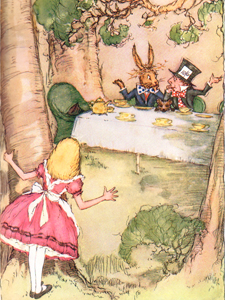Carroll's Classic Celebrates Sesqui-Centennial

"There was a table set out
under a tree in front of the house,
and the March Hare and the Hatter
were having tea at it."
This year, 2015, is the 150th anniversary of the publication of "Alice in Wonderland" and tea lovers around are sharing their love of this enduring (and endearing) tale. Like many classic children's books, Alice is more- much more- than it seems. It charms on two levels. For children, it's a phantasmagorically rich story sprinkled with nonsense. And, for adults, it's a droll satire of Victorian manners with a nod to the lack of food safety during that era. Protocol was all-important in rule-conscious Victorian society and the bible was "Hints on Etiquette and the Usages of Society" by a "lady of rank," first published in 1834 and reprinted 28 times until 1854. (It subsequently crossed the pond where it was adapted by Charles Wm. Day.) Among the rules for proper dining etiquette were these admonishments:
"...finger glasses, filled with warm water, come on with the dessert. Wet a corner of your napkin, and wipe your mouth, then rinse your fingers; but do not practice the filthy custom of gargling your mouth..."
"You cannot use your knife or fork or teeth too quietly."
"It is considered extremely piggish to have an overloaded plate, piled up with an heterogeneous mass of edibles."
"Ladies should never dine with their gloves on—unless their hands are not fit to be seen." Carroll lampooned the book in his own retort, "Hints for Etiquette; Or, Dining Out Made Easy," written when he was a young man. In "Alice," his took jabs at etiquette and, more pointedly, acknowledged the danger of eating and drinking 19th century foods, and with good reason. Some bakers laced pastries with arsenic or plaster of Paris. Grocers mixed tulip bulbs with onions to confuse unsuspecting shoppers. And, despite the rise of cheap sugar, some vendors added chalk to flour or milk to increase profits. Many adults and children died from some of these, and other, food adulterations which were so widespread, that government committees investigated and the newspapers reported their progress so often that, finally, food safety laws were enacted. Some food additions were harmless and reflected how bland the cuisine and how unsophisticated people were when it came to herbs, spices and ingredients from outside the Commonwealth. For example, few cooks seasoned with (horrors!) ground pepper, a spice thought foreign and repugnant. "When I'm a Duchess," she said to herself (not in a very hopeful tone though), "I won't have any pepper in my kitchen at all. Soup does very well without. Maybe it's always pepper that makes people hot-tempered," she went on, very much pleased at having found out a new kind of rule,"and vinegar that makes them sour—and camomile that makes them bitter—and—and barley-sugar and such things that make children sweet-tempered." Today, spices have found their way into British cuisine, and international foods from Asia to Africa are readily available. Spices are even evident in tea with garam masala blends for classic chai popular and ubiquitous. As for etiquette, both in Britain and here, finger glasses have vanished from formal dining, but being neat and tidy and pretty remain a vital part for the fun and hospitality of entertaining with friends. What constitutes good manners has eased up considerably, yet the caveat to be kind and gracious, whether host or guest, is ever and always in style, especially for afternoon tea. "Yes, that's it! Said the Hatter with a sigh, it's always tea time." So, lay out your loveliest cloth napkins and ask everyone to tell a story or two (true or not) or take turns reading your favorite scenes from "Alice." Serve your sweets and savories on your best plates and pour your tea from fine teapots and teacups for a Mad Hatter's Tea Moderne. Children will love our Alice in Wonderland blend. It's deliciously fruity, and adults will appreciate that it's caffeine-free. Savor the rose petals blended with green rooibos, apple, raspberry, strawberry, blue cornflower and natural creme flavor. One sip and you'll find yourself in wonderland.
NOTE: Yes, we know: Carroll's first version of the book appeared in 1862 as "Alice's Adventures Under Ground" and had several versions before the final one, retitled "Alice in Wonderland," was published in 1865. Lewis Carroll is the pseudonym of mathematician Charles Lutwidge Dodgson.
"It was a curious dream, dear, certainly: but now run in to your tea; it's getting late."
